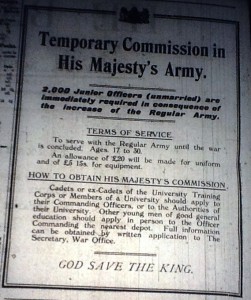A correspondent writes: I have seen in many of the daily papers, “advice to good housewives” to lay in stores of food and other necessaries at once against the possibility of lack of provisions in the future; and I have myself remarked that the inhabitants of Banbury and its neighbourhood are endeavouring to protect themselves in this manner. Surely in a time of national crisis, we should endeavour in the first place to be good citizens, not “good housewives”. The following is in protest against this advice and this practice.
It must be obvious to all that the power of an individual to lay in stores is dependent upon the length of his purse. The rich, who have capital at their command, can, without serious financial loss, provide themselves with enough to support them for a siege of a year’s duration. The poor man, who earns little more in a week than will suffice him for that week, can make no such provision for the future. Now what are the exact effects of this system of insurance in which only a few can participate? I will, for the sake of clarity, give a few of them, in a categorical form.
- The sudden increase of the demand for necessities on the part of those who are able to lay in stores must, and already has, raise the price of food. Hence the well-to-do, whilst protecting themselves for the future, are laying an immediate burdensome, and most unjust tax, on the poor. Moreover this rise in prices now, is by no means justified by the lack of actual goods at the moment, but is the result of the self-defensive policy on the part of those whose imagination cannot reach outside their back-door.
- The suddenness of the demand at the moment, and possibly worse panic in the future, must create a jerky demand, the waves of which will react from the retailer to the ultimate producer. This disorganisation of the market will raise the average of prices both immediately and subsequently, for prices can only approximate to the lowest possible level when an uninterrupted suction of demand is maintained. Thus both rich and poor will suffer to the benefit of the successful speculator.
- Those who have laid in sufficient stores for all eventualities will obviously not have the same incentive as others to economise their consumption. The sufficiency, or extravagance, of their consumption may be equated by the want of the less fortunate.
- We may divide those who have laid in stores into three classes: Those whom future events prove to have laid in exactly the amount required; those who have laid in more than enough; and those who have laid in less than enough. The result of the actions of the first class we have already investigated. The result of the action of the second class must be obvious to all. On the one had necessities have been accumulated to waste, and on the other, men suffer for the lack of that waste. The rich have not used the food to fill their stomachs, but to appease their fears. The result of the action of the third class is not so obvious. In the first instance they have rendered the poor poorer by raising prices. Then they have saved during the period of the gradual consumption of their stores. Finally, they enter the market again, and owing to the strength of their demand, resultant from their saving in the second stage, force prices up once more to a point higher than would have been possible had they been unselfish enough to bear their portion of the burden and buy all along the line as the poor are forced to do.
- The only persons actually justified in laying in stores at the moment are those without capital, who are likely to lose their employment in the future. They may by this means be able to keep their home together longer, and the longer they can remain independent of outside assistance the greater will be the economy to the nation as a whole. For though they tax the community, as others do, by raising prices now, still in so far as this tax tends to induce the general public to economise in their immediate consumption, in so far is it preferable to the compulsory contributions of the future.
Surely in a crisis such as this it would be better to abandon competition and form co-operative societies for the preservation of those commodities, such as butter and eggs, the supplies of which are actually cut off, to refrain from every action which could intensify excitement or create panic, and to abandon self-protective measures for measures of mutual protection.
Banbury Guardian, August 1914
